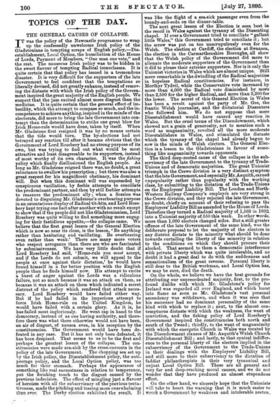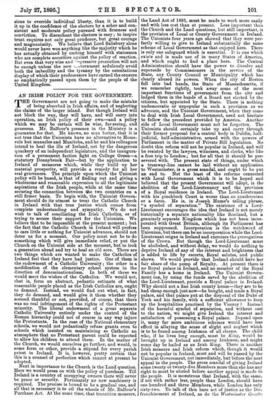TOPICS OF THE DAY.
1HE GENERAL CAUSES OF COLLAPSE.
IT was the policy of the Newcastle programme to wrap up the confessedly unwelcome Irish policy of the Gladstonians in tempting scraps of English policy,—Dis- establishment, Local Option, the humiliation of the House of Lords, Payment of Members, " One man one vote," and the rest. The nauseous Irish policy was to be hidden in the sweet flavour of tempting Radical iconoclasms. It is quite certain that that policy has issued in a tremendous disaster. It is very difficult for the supporters of the late Government to feel confident that the temptations so liberally devised, did not greatly enhance, instead of remov- ing the distaste with which the Irish policy of the Govern- ment inspired the great majority of the English people. We suspect that the jam excited almost more disgust than the medicine. It is quite certain that the general effect of im- becility, which the attempt to compass so much, and the in- competence to achieve anything, inspired in the minds of the electorate, did more to bring the late Government into con- tempt than the determination to strike one great blow for Irish Home-rule would have done, taken by itself. When Mr. Gladstone first resigned it was by no means certain that the tide would turn. The by-elections had not betrayed any reaction till after it became obvious that the Government of Lord Rosebery had no strong purpose of its own, but was trying to find out what would be most attractive and least disagreeable to its supporters, instead of most worthy of its own character. It was the fishing policy which finally disillusioned the English people. As long as Mr. Gladstone reigned there was, no doubt, a great reluctance to swallow his prescription ; but there was also a great respect for his magnificent obstinacy, his dominant will. But when this dominant will was superseded by conspicuous vacillation, by feeble attempts to conciliate the predominant partner, and then by still feebler attempts to reassure the predominant ally ; when a Session was devoted to disguising Mr. Gladstone's overbearing purpose in an ostentatious display of Radical tit-bits, and Lord Rose- bery kept trying one bait after another with no result except to show that if the people did not like Gladstonianism, Lord Rosebery was quite willing to find something more engag- ing for their fastidious appetite,—the collapse came. We believe that the first great lesson of the General Election which is now so near its close, is the lesson, Be anything rather than hesitating and vacillating. Be overbearing even rather than weak.' There are many more voters who respect arrogance than there are who are fascinated by submissiveness. We have very little doubt that if Lord Rosebery had said, ' Home-rule you must accept, and if the Lords do not submit, we will appeal to the people at once against their dictation,' he would have found himself in a far better position with the English people than he finds himself now. His attempt to excite a burst of anger against the Lords was a ridiculous failure, not so much because it was an attack on them, as because it was an attack on them which indicated a secret distrust of the policy which rendered that attack neces- sary. Lord Rosebery would have failed either way. But if he had failed in the imperious attempt to force Irish Home-rule on the United Kingdom, he would have failed with a certain glory. As it is, he has failed most ingloriously. He went cap in hand to the democracy, instead of as one having authority, and there- fore there was what there otherwise would not have been, an air of disgust, of nausea even, in his reception by the constituencies. The Government would have been de- feated in any case. But it has not only been defeated, it has been despised. That seems to us to be the first and perhaps the greatest lesson of the collapse. The con- stituencies were made sea-sick by the cross-currents in the policy of the late Government. The chopping sea set up by the Irish poliey, the Disestablishment policy, the anti- peerage policy, and the Local Option policy, was too much for their stomach. Perhaps the appearance of something like real earnestness in relation to temperance, put the finishing touch to the disgust caused by the previous indecision. The effect of mingling just a flavour of heroism with all the subserviency of the previous tenta- tiveness, made the pitching and tossing more overwhelming tb&TI ever. The Derby election exhibited the result, It was like the flight of a sea-sick passenger even from the brandy-and-soda on the dinner-table. The next great lesson of the Election is seen best in the recoil in Wales against the tyranny of the Dissenting chapel. If ever a Government tried to conciliate " gallant little Wales," this Government tried to conciliate it ; but the screw was put on too unscrupulously even for the Welsh. The election at Cardiff, the election at Swansea, the election in the Carmarthenshire Boroughs, all show that the Welsh policy of the Government did more to alienate the moderate supporters of the Government than it did to please their extreme supporters. Nor is it only the Unionist victories in Wales which are almost unique. Still more remarkable is the dwindling of the Radical majorities in hopeless Radical constituencies. For instance, in Merthyr Tydvil, while the Conservative vote increased by more than 4,000 the Radical vote diminished by more than 2,500 for the higher Radical, and more than 3,200 for the lower. The secret of this General Election in Wales has been a revolt against the party of Mr. Gee, the frantic Welsh journalist, and the dictatorial Dissenters who followed him. We do not suppose that mere Disestablishment would have caused any reaction in Wales. But the cruel terms of the Disendowment, which showed not a grain of generosity, not to mention such a word as magnanimity, revolted all the more moderate Disestablishers in Wales, and stimulated the distaste which the tyranny of the chapel had already begun to sow in the minds of Welsh electors. The General Elec- tion is a lesson to the Gladstonians in favour of some- thing like magnanimity towards opponents. The third deep-rooted cause of the collapse is the sub- serviency of the late Government to the tyranny of Trade- Unions and of democratic majorities. The great Unionist triumph in the Crewe division is a very distinct symptom that the late Government, and especially Mr. Asquith, earned rnpopularity rather than popularity with the working class, by submitting to the dictation of the Trade-Unions on the Employers' Liability Bill. The London and North- Western Railway Company's employes are very strong in the Crewe division, and they rejected the late Government, no doubt, chiefly on account of their refusing to pass the Employers' Liability Bill as amended by the House of Lords. Therefore they turned a Radical majority of 1,568 in 1892, into a Unionist majority of 550 this week. In other words, more than 1,000 electors changed sides. But a still greater offence of the late Government of the same kind, was the deliberate proposal to let the majority of the electors in any district dictate to the minority what should be done towards curtailing the liberty of the minority in relation to the conditions on which they should procure their alcohol. That seemed to them a democratic interference with private liberty which was quite intolerable, and no doubt it had a great deal to do with the suddenness and sensationalism of the great reverse. Personal liberty is still dear to the British workman, and Local Option has, we may be sure, died the death.
On the whole, we believe we have the best grounds for attributing our unprecedented majority, first, to the pro- found dislike with which Mr. Gladstone's policy for Ireland was regarded all over England, and which burst into flame as soon as Mr. Gladstone's vast personal ascendency was withdrawn, and when it was seen that his successor had no dominant personality of the same kind with which to replace it ; next, to the almost con- temptuous distaste with which the weakness, the want of conviction, and the fishing policy of Lord Rosebery's Government inspired the constituencies both north and south of the Tweed ; thirdly, to the want of magnanimity with which the energetic Church in Wales was treated by the Disendowment clauses of Mr. Asquith's Welsh Church Disestablishment Bill ; and lastly, to that cynical indiffer- ence to the personal liberty of the electors implied in the subserviency of the Government to the Trade-Unions in their dealings with the Employers' Liability Bill, and still more to their subserviency to the dictation of faddist philanthropists in their very tyrannical and unjust Local Option Bill. These are all general and very far and deep-reaching moral causes, and we do not wonder that they have produced an almost stupendous effect.
On the other hand, we sincerely hope that the Unionists will take to heart the warning that it is much easier to Wreck a Oevernnlent by weakness and intolerable preten_ sions to override individual liberty, than it is to build it up in the confidence of the electors by a sober and con- sistent and moderate policy pursued with firmness and conviction. To disenchant the electors is easy ; to inspire trust requires not only great prudence, but great courage and magnanimity. We believe that Lord Salisbury alone would never have won anything like the majority which he has actually obtained by uniting himself with statesmen who are complete securities against the policy of reaction. But even that very wise and repressive precaution will not be enough unless the new u overnment sedulously avoid both the imbecility and the tyranny by the ostentatious display of which their predecessors have earned the censure so emphatically passed upon them by the people of the United Kingdom.



































 Previous page
Previous page